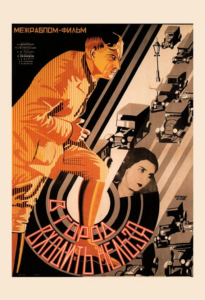A spec script is a script written under speculation that it will be sold. There’s no sale or deal in place, and the script is not commissioned. In other words, no one pays you to write a spec script. You use your own original ideas and concepts with the hope that you can sell them or use them to obtain representation or consideration for writing assignments.
You’re not writing for an audience on spec — only the script reader will see it. Script readers are inundated by scripts, so it’s important that yours be original and stand out.

Scene from “A Quiet Place”
Writing “On Spec”
Writers starting out will typically write all scripts “on spec.” Spec scripts can include:
- Feature film spec scripts
- Spec TV scripts
As you’re writing, you’ll need to push your imagination to make the script you write on spec as compelling and original as possible. Doing so will set your spec script apart from the piles of scripts on the reader’s desk.
How Long Are Spec Scripts?
Spec scripts aren’t any different from commissioned scripts in terms of length. Standard 90-minute films will call for a script that’s about 110 to 120 pages long.
Essential Parts and Elements to Elevate Your Spec Script
Before you dive into writing, you’ll need to do some work to prepare so that you better understand the basics of filmmaking and what makes an engaging film.
Prep work should also include the following steps to hone your skills:
- Commit to screenwriting
- Read great screenplays
- Read screenwriting books
- Re-watch movies you wish you’d written
- Make a script outline of a movie as you’re watching
- Get some screenwriting software
- Learn how to format a script
- Review scriptwriting resources, including learning how to get an agent and how to write for TV
Once you’ve done some prep work, you can dive into creating the best possible spec script. A great spec script will contain all of the following elements:
- Concept
- Characters
- High stakes/conflict
- Scenes that read like moments
- Fluid pacing
- Straightforward formatting
Concept
Starting with the logline, you’ll need to create a clear, concise, and compelling concept. You can’t usually sell a spec script in Hollywood if it’s not driven by a concept. Quirky films and character-driven scripts often work best when you can work in the indie film world with local filmmakers. The screenwriting path you take should consider that.
To get a spec script noticed in Hollywood, you need a concept that can engage people in fewer than 25 words. A high concept typically encompasses a compelling concept paired with a gimmick.
A gimmick should capture a script reader’s interest instantly and could be:
- A character
- A situation
- An idea
Then, the concept is the intention or plan around the gimmick that leads to a compelling story.
In “Jaws,” the gimmick is the shark; the concept comes from the characters who come together to destroy the shark.

Scene from “Jaws”
In “Jurassic Park,” the gimmick is the dinosaur park, while the concept is what happens when everything goes totally awry in the worst ways possible, and the specific characters are stuck in the park.

Scene from “Jurassic Park”
The concept is an essential element of any spec script. Readers want a compelling concept they haven’t seen previously.
Ways to shake up a concept:
- Consider the type of movie you’d want to see.
- Brainstorm ideas for how you can switch up your initial movie idea to make it more original; try writing a logline to capture the conflict you set up in your script’s first act.
- Read pro screenwriters’ treatments and story outlines.
- Write out a screenplay outline.
- Get feedback on both your logline and treatment.
Characters
Aspiring screenwriters often create characters that don’t stand out. Protagonists can come out boring if you’re writing a character you identify with, and you’re subconsciously protecting them (either from actions in the plot or from audience judgment).
Key steps as you’re writing characters include:
- Getting feedback on main characters by describing them to others
- Making sure your characters have contradictions — it makes them human and three-dimensional
- Adding a character arc
- Learning how to create great dialogue
High Stakes and Conflict
Constantly inject conflict into your script to raise the stakes. Conflict keeps readers engaged, so raise the stakes every few pages.
Moments vs. Scenes
You don’t want just a collection of scenes. Every scene you write must be a moment that contains emotions and moves the characters forward, and every moment needs to hold importance. Moments should continuously build on each other to create a successful screenplay.

Scene from “Sophie’s Choice”
Tips for creating scenes:
- Write out every scene in a beat sheet or outline.
- Make sure every scene ends with a question, making the reader wonder what will happen next.
- Pull your characters out of their comfort zones. They shouldn’t just sit around chatting without conflict.
- Change up your situations and locations.
- Make sure your characters are surprised by events happening in every scene. If characters are surprised, your audience will be too, and vice versa.

Scene from “Good Will Hunting”
Uncomplicated Aesthetics, Fluid Pacing
Spec scripts should be quick and easy to read while keeping the reader engaged. Otherwise, they just won’t get read by production or development offices. Your script should pull the reader in from the first moments, embracing that old less is more idea.
Format Should Be Simple and Straightforward
If the reader doesn’t see consistent formatting that sticks to general industry standards, they’ll have difficulty feeling out the pacing and envisioning the story. You should focus only on:
- Character names
- Dialogue
- Scene descriptions
- Scene headings
A few transitions or sluglines are fine. Otherwise, keep things simple.
Things That Should Never Go Into a Spec Script
There are a few things you should avoid putting in your spec script entirely. These include:
- Acting demands
- Camera directions
- Cast lists
- Dates and logos
- Scene numbers
- Set lists and prop lists
- Summaries of character action
- Too much capitalization
- Unnecessary action repetition
Tips for Writing A Spec Script
Follow these general tips for creating good, engaging writing while you move along in the process:
Write for the Ear
Read your script out loud, and watch out for words that have different meanings but sound alike.
Avoid Passive Voice
Active voice distinguishes between subjects and verbs, so readers don’t have to wait until the end of a sentence to know who did what action.
Use Present Tense
The present tense creates a hook.
Write for People
People want to feel like stories are directed at them.
Use Action Verbs
Verbs add life to your stories.
Use Caution With Numbers
Numbers, especially when there are a lot in a sequence, can be difficult to absorb. Make your point with one or two numbers.
Move the Story Forward
Again, any good story leaves the audience (or script reader) eager to move on to what will happen next. Keep the reader turning those pages.
Where Do You Submit a Spec Script?
Your overall aim with a spec script is to find a permanent job working as a writer at a studio or for a producer. Top places you can submit work now include:
- Amazon Studios
- BBC script room
- The Blacklist
How Much Does a Spec Script Sell For?
So your spec script got picked up, and they made it into a movie! Now what? Spec scripts usually are sold for about 2% to 5% of a movie’s budget. Take a movie with a budget of $100 million as an example. The scriptwriter stands to make about $2 million to $5 million.
Though spec scripts are becoming less common, there’s still a need for original stories and voices. Hollywood is still buying spec scripts. In fact, you’ll find plenty of recent spec-script deals.
You can find a variety of services and mentorship programs designed to give you insights into the business as you learn about developing your spec script.
Attending film school can give you valuable insights into how movies are made, which in turn will inform your writing as you create compelling spec scripts. You can learn more about film and how you can improve your skills by applying to the Nashville Film Institute here.















